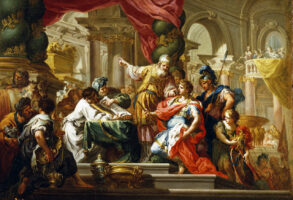
Published May 24, 2017
The news of Peter Augustine Lawler’s death Tuesday morning came as a horrible shock. He was 65, which doesn’t count as old anymore. And he was active and energetic as ever. His latest essay, on Alan Bloom, had just appeared that morning at The Public Discourse. I had spoken with him on the phone just a couple of days earlier, and was set to see him the very next evening—at an event in Washington to mark his newly launched editorship of Modern Age, the flagship journal of his beloved Intercollegiate Studies Institute. It’s still hard to believe he could be gone.
The scope of the loss is a little hard to fathom because the reach of Peter’s influence was far greater than a casual observer of his work could have seen.
This was so, for one thing, because Peter was first and foremost a teacher—at Berry College, of which he was always so proud, and in ISI’s various programs for students. He shaped generations of students to take their country seriously, but to take their souls even more seriously. I am constantly running into young conservatives, and some young liberals too, who have been formed by his teaching or writing. Peter also devoted a great deal of his energy, especially in the last few years, to the explicit defense of such formation—that is, of genuine liberal education.
His influence as a teacher and thinker was also a function of his gregarious humor and charm, his talent for friendship, and his sheer brilliance. But ultimately, it likely had to do above all with the distinct worldview he articulated, which has done an enormous amount to deepen, humanize, and enrich contemporary conservatism.
A Restless Mind
I first met Peter Lawler in 2003, when he was named to George W. Bush’s bioethics commission and I worked on the commission’s staff. I had read by then, in graduate school, his utterly extraordinary book The Restless Mind (about which, more below), but Peter in person was a stark surprise. A kind of ironic Southern stoic, at least on the surface, he took great pleasure in the absurdity of Washington, and he also went out of his way to get to know (and to offer advice and real help to) the commission’s young staffers. We were soon friends, and over the years that followed I was privileged to spend a lot of time with Peter—frequently talking politics on the phone, looking over drafts of his writing and getting his help with mine, visiting him at Berry College on a few occasions or seeing him in Washington.
A conversation with Peter always involved intense concentration to make out what he was saying though an intentionally mumbling, almost whispered drawl. But it was well worth the effort—as he always had a clever theory at the ready to explain the political scene, and a strongly held opinion about some television show you had to watch. Peter adored the popular culture, unlike most conservatives of his generation. He took it seriously, too. And if you hadn’t seen “Friday Night Lights” he wouldn’t talk to you until you did.
He also took a real and serious pleasure in our politics, and particularly in the intersection of politics and culture. In the last few months, he frequently emailed around quotes from Jonah Goldberg’s weekly newsletter or little notes about the Commentary magazine podcast or something Rod Dreher or Ben Domenech had written.
In fact, little notes were a Lawler specialty. He had a peculiar habit of, without any context, sending his friends who were writers responses to things we’d published—so an email might say, in its entirety: “You might call what you’re arguing for libertarian means to non-libertarian ends in education.” I’d then try to figure out what he had read that led to the note. It was usually easy enough, but a few months ago I got a note from Peter that just read “Don’t forget God. Without looking up to something true, none of it holds together.” I decided to just treat this as an excellent all-purpose piece of advice, and never did get around to asking him what he was referring to.
This kind of easy informality was always part of Peter’s own (non-academic) writing. A characteristic Lawler essay might begin with the word “so” and then meander around into a great story, and end up making a profound argument about how to live. His openness to drawing the most important truths out of the most mundane facts of our common life was one important reason he saw so much that others didn’t.
Another reason was his comfort with paradox. Peter could be a little hard to classify sometimes. He was a Southern gentleman, though he had actually grown up in the suburbs of Washington DC. He was deeply conversant in the popular culture but also deeply learned in the Western tradition. He reveled in irony and absurdity, but was more earnest than pretty much any political thinker of our time. He had a habit of speaking in riddles.
Ultimately, what tied all this together was the simple but profound fact that Peter was a Christian—an American Catholic of a very particular sort. He identified that sort above all with Orestes Brownson, the nineteenth-century thinker whose renown he sought to revive. But Peter articulated it in twenty-first-century terms in a way quite distinct to himself. He had a teaching all his own. It was inseparable from his personality and persona, but it was also rooted in a particular theoretical insight, and it provided him with a unique and vital voice on the contemporary right.
Postmodern Conservative
The Restless Mind may be the place to start in seeking out that teaching. On its face, that book argues persuasively that the worldview of Alexis de Tocqueville was shaped less by Rousseau’s political philosophy (as most Tocqueville scholars suggest) than by Pascal’s psychology. Peter wrote or edited 18 books in the course of his productive career, but that 1993 masterpiece still strikes me as the most Lawlerian of them all. It is about much more than Tocqueville, though it has had great influence on how Tocqueville is understood. It offers a piercing assessment of the strengths and weaknesses of modern life, concluding that we who live in modern free societies are destined to be a little crazy, and that this might be a good thing.
Modern life, he suggested, is characterized by an effort to invent a highly individualistic form of the human person. This kind of person should be capable of unprecedented freedom, and therefore perhaps unprecedented happiness too. But it isn’t really possible for actual human beings to be so thoroughly individualistic. So actual human beings can never really be quite happy while playing the role that modern free societies assign them. That means they will be restless, and eager for a different role. That restlessness is a source of endless anxiety, but also of hope—because it sends us searching for a way of life better suited to who we really are. It means modernity will always be producing its own critics and always live in a kind of creative tension with itself.
That insight, already evident in some of Peter’s earliest work, is the thread that runs through his most important arguments. In bioethics, a focus of his work in the 1990s and 2000s, it led him to a social conservatism clearly critical of the excesses of techno-utopians of various sorts but not actually all that alarmed by them. The post-humanists were more ridiculous than worrisome, he thought, and ultimately the more successful they were the more resistance they would meet and strength they would lend to their traditionalist adversaries.
As he wrote, “Contrary to the hopes of our new eugenic utopians—and to the fears of some conservative Nietzscheans—we do not have the capability to make for ourselves a ‘posthuman’ future.” In fact, he argued, “we can reasonably anticipate, therefore, that the limited but still quite real successes of the biotechnological project in fending off death and disease will be the cause of a religious revival.”
The same attitude is evident in a great deal of Peter’s more recent work. It is what led him to describe himself as a “postmodern conservative”—the name he gave to the group blog he led at the First Things website and then at National Review Online. He knew, of course, that the term “postmodern conservative” would be provocative, and easily misunderstood. But he had a very particular definition in mind. “Conservative thought today is authentic postmodernism, but it is, obviously, not postmodernism as it is usually understood,” he argued.
What people usually call postmodern is actually hyper-modern, in that it extends the modern project of deconstructing nature through reason to its absurd conclusion of deconstructing reason itself. Conservatives, by recognizing the limits of the entire project from the outset, can see more clearly where it was right and where it was wrong. In fact, he wrote,
Conservatives can be (perhaps the only) genuinely postmodern thinkers. The reason we can see beyond the modern world is that its intention to transform human nature has failed. Its project of transforming the human person into the autonomous individual was and remains unrealistic; we can now see the limits of being an individual because we remain more than individuals. The world created by modern individuals to make themselves fully at home turns out to have made human beings less at home than ever.
The solution to this problem is not to abandon modern life and its fruits (as some conservatives might want to do) but to recognize its limits and address their consequences by finding ways, within modern societies, to treat people as more fully relational beings. “So to be postmodern and conservative,” Lawler argued:
is to take our stand somewhere between the traditionalists and the libertarians. The traditionalists’ focus is on who each of us is as a relational being with duties and loyalties to particular persons and places. The libertarians — or, to be more clear, the individualists — focus on who each of us is as an irreducibly free person with inalienable rights, a person who can’t be reduced to a part of some whole greater than himself or herself. A postmodern conservative is about showing how a free person with rights is also a relational person with duties. The truth is that each of us is a unique and irreplaceable free and relational person.
The implications of this view run far and wide and deep, and can help us to think about the state of our society, culture, economy, religious communities, technology, and much more. Peter’s attempts to articulate this view across a broad range of subjects over decades makes for a sprawling achievement, if one difficult to summarize. I think the closest he came to simply laying it out in one place was in this 2013 essay, which I highly recommend.
His assessment of our postmodern condition was entirely part and parcel of his approach to the popular culture, politics of the day, and state of liberal education. It was always delivered through his brand of slightly amused, seemingly ironic, but actually earnest and searching arguments. In the end, this view also left him thoroughly sympathetic with the travails of Americans left anxious, under-served, or under-privileged in our times.
Our culture is shot through with alienation and homelessness precisely because there is something inhuman about its conception of the individual, he argued:
The modern individual—or the philosophers who constructed him—might be understood to be animated by the most insane form of pride ever. The modern individual aims to create in this world—not through grace but through human work—what God promised in the next. But viewed in another way, the modern individual seems less proud than desperate. The Christians are right about human misery and contingency; the modern individual is totally taken in by Augustine’s ‘negative’ rhetoric about human alienation. But he does not believe in the Christian God; Augustine’s ‘positive’ rhetoric about grace, providence, and salvation does not move him at all. And so he has no choice but to try to do for himself what the Christians believed God would do. The individual finds himself with a heavy—really, a horrible—burden. The modern individual is an alien—an absolutely contingent being who belongs nowhere in particular—who must build for himself his own place in the world.
This is a particularly painful condition for those not well equipped to enjoy the greatest blessings of modernity. It is understandable that some Americans in such situations in particular would approach politics with an eye to breaking down the system rather than preserving it.
Our True Home
The day after the 2016 election, Peter called me saying he would like to write an essay about the state of our politics for National Affairs, the quarterly journal I edit. I took no convincing, and the essay he wrote offers a great encapsulation of how his overall diagnosis of our modern condition can translate into more immediate and practical analysis. It offers an assessment highly sympathetic to Donald Trump’s voters, if not to Trump himself, grounded in the sense that American politics has forgotten how to treat many Americans like human beings.
As Lawler put it in his final published work, the essay on Bloom published the day he died:
I’m far from endorsing Trumpism, which attempts to counter being nice with being brutal. But there’s a lot to be said for any effort that restores the country as a real source of human loyalty and reminds us of the nobility and indispensability of relational virtue.
But Peter’s core insight points well beyond politics of course, to the most fundamental of matters. “Postmodernism rightly understood,” he wrote:
begins with the realization that we should, in fact, be grateful for what we have been given. We have been given not only self-conscious mortality and a mysterious freedom to negate nature, but all sorts of natural compensations for our distinctively human misery. Love is not an illusion, and we have been fitted by nature to know the truth. Both love of each other and love of the truth depend, as far as we can tell, on the inevitability of death. As far as we can tell, self-consciousness—with all the virtues and distinctively human enjoyments it makes possible—depends on our having corruptible bodies. The fact that despite all that nature has given us we remain somewhat alienated might reasonably be seen as evidence that our true home lies elsewhere, and that it is in our nature to long for a personal God.
Peter Lawler left us with much to be grateful for, and much to continue to learn from. We were terribly lucky to have him. RIP.
Yuval Levin is the editor of National Affairs. He is also the Hertog Fellow at the Ethics and Public Policy Center, a senior editor of The New Atlantis, and a contributing editor to National Review and The Weekly Standard.








